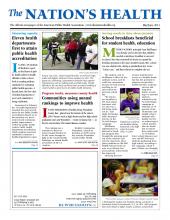Benefits of quitting smoking outweigh health risks
Regardless of possible weight gain, quitting smoking is linked to reduced risk of cardiovascular disease, according to a study in the March 13 issue of the Journal of the American Medical Association.
Cigarette smoking is the leading cause of preventable death in the United States and a major risk factor for cardiovascular disease. The study found “weight gain that occurred following smoking cessation was not associated with a reduction in the benefits of quitting smoking” on cardiovascular disease risk among adults without diabetes.
“This supports a net cardiovascular benefit of smoking cessation, despite subsequent weight gain,” the study’s authors wrote.
Compared with smokers, the study based on a 25-year follow-up of data from the Framingham Offspring Study found long-term quitters had a 54 percent lower risk for cardiovascular disease than smokers. That lower risk was only minimally changed among those who had gained weight after quitting.
Accessible parks lead to more walking
Residents of new housing developments walk more when they have access to shops and parks, a recent study found.
The 10-year Australian study found the overall health of residents of new housing developments improved when their daily walking increased because they had more access to parks, shops, public transportation and services. The study found each shop increased residents’ physical activity by 5-6 minutes a week and each recreational facility such as a park or beach increased residents’ weekly physical activity by 21 minutes.
“As neighborhoods evolve, longer-term follow-up is required to fully capture changes that occur and the impact on residents,” the study’s authors wrote. “The potential for using policies, incentives and infrastructure levies to enable the early introduction of recreational and transport-related facilities into new housing developments warrants further investigation.”
The study looked at housing developments in metropolitan Perth in Western Australia and was published in the January issue of Social Science & Medicine.
DDT exposure linked to hypertension
Prenatal exposure to the pesticide DDT is linked to hypertension in women, according to a study published online March 12 in Environmental Health Perspectives.
The study found that infant girls exposed to high levels of DDT while still in the womb were three times more likely to develop hypertension as adults. Previous studies have linked adult DDT exposure with hypertension. While the U.S. Environmental Protection Agency banned the use of DDT in 1972, the pesticide is still use in other countries such as India and South Africa.
Researchers analyzed concentrations of DDT in blood samples collected from women who had participated in the Child Health and Development Studies between 1959 and 1967 and also surveyed the adult daughters of those women to see if they had developed hypertension. They found a three-fold risk of hypertension among women who had been exposed to DDT during their mothers’ pregnancies.
“These findings suggest that the association between DDT exposure and hypertension may have its origins early in development,” the study’s authors wrote.
Too much calcium ups risk of cardiovascular disease death in women
High calcium intake could double a woman’s risk of cardiovascular death, a recent study found.
Published online Feb. 12 in the British Medical Journal, the study found high intakes of calcium from both diet and supplements as well as low calcium intake were at higher risk for death. Risk for death from cardiovascular causes was twice in women whose calcium intake was higher than 1,400 mg per day. Those with calcium intake of less than 600 mg a day were also had higher death rates than women with an intake of 600-999 mg a day.
During the 19-year follow-up of women in the Swedish Mammography Cohort, a third of the deaths were from cardiovascular disease, 16 percent were from heart disease and 8 percent were from stroke. Women who had a higher intake of calcium at more than 1,400 mg a day and were taking supplements had a higher death rate than those not taking supplements.
The study’s authors said diets very low or very high in calcium can override normal homeostatic control, causing changes in blood levels of calcium.
APHA: Medicaid should cover preventive care
Medicaid programs should cover preventive services that have been recommended by a physician, APHA said in comments submitted to the Centers for Medicare and Medicaid Services Feb. 21.
The comments, in response to a proposed rule that addresses Medicaid and other programs, said requiring coverage of preventive services, “is an important step towards ensuring that Medicaid and (Children’s Health Insurance Programs) beneficiaries have access to available, recommended preventive services.”
The comment was initiated by Trust for America’s Health and Nemours and signed by 11 other public health and children’s health groups.
- Copyright The Nation’s Health, American Public Health Association









